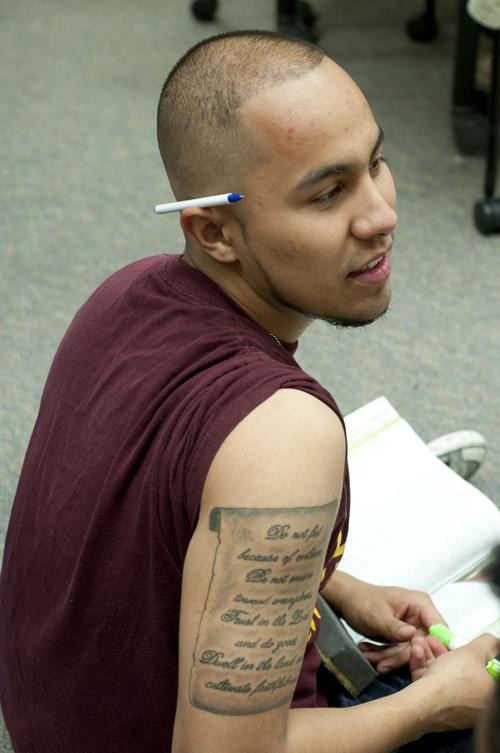Chelsea Delarippa says that the best narrative of her life can be found in the ink on her body.
Dellaripa, a visual arts junior, said, “I got my tattoos because they have special meaning to me. It’s like telling a story on my body, and now they’re a part of me. They are especially important to me because I drew all of my tattoos.”
While some people get tattoos to display their art, others get tattoos in memory of their loved ones.
“I decided to get my first tattoo in response to the death of my sister. I wanted her to always be a part of me physically,” Sheridyn Miller psychology senior said.
Many people interested in getting a tattoo explore several options before they pick a parlor to do their tattoo.
“I first found tattoo parlors online and went to visit each one. I examined their work and sterilization methods to make sure the needles and ink were always new. They always explained the process and showed me that the needles, ink and gloves were new and only used on me,” Miller said.
Uptown Tattoos uses several processes and procedures to sterilize all of their equipment.
“All of our equipment is sterilized through autoclaving, which is the same sterilization process that hospitals use,” said floor worker Megan Acosta of Uptown Tattoos.
Other common precautionary measures include using needles only once, separating all ink, scrubbing the tattoo tubes with Comet, and bagging each tube individually.
Artists also spray down their tattooing stations with MadaCide, a disinfectant, and anything touched by the artist is wrapped in plastic.
“It is up to the individual to take care of the tattoo. We’ve seen cases of infection, but all of the cases have been due to the person’s lack of care for their new tattoo,” Acosta said.
Uptown Tattoos conducts this thorough sterilization to prevent the transmission of any infections or diseases that can occur during tattooing.
“Exposure to hepatitis, HIV, staff infections, and any blood-borne diseases can be contracted through tattooing. The two most severe diseases that can be contracted are hepatitis B and HIV because they are both incurable,” said Irina Foxman, a nurse practitioner of the Loyola Student Health Center.
Skin reactions can also occur with tattooing.
“Allergic reactions to tattoo dye is serious because it is difficult to remove the dye once it is in the skin,” said Erin Frye, a nurse practitioner of the Loyola Student Health Center.
The key to obtaining the most desirable tattooing experience is being aware of the health risks involved with tattooing, and to be careful to choose a location that uses safe tattooing methods.
Renee Dottolo can be reached at

Gypsy Richmond, music industry business, senior shows a tattoo on her shoulder. (MONICA VO/Staff Photographer)

Zach Goldak. mass communication sophomore, has an outline ink sleeve. (MONICA VO/Staff Photographer)

History professor Mark Fernandez shows off his ink containing the words “Sweet Pea.” The name “Sweet Pea” refers to his imaginary friend. (MONICA VO/Staff Photographer)

Kyle Locascio, criminal justice freshman, tattoo is of a lion’s pawprint. (MONICA VO/Staff Photographer)

William Duhe, physics junior, says his tattoo represents his philosophy put into ink. His tattoo encompasses a dreamcatcher and various nature elements. (MONICA VO/Staff Photographer)

Craig Beebe, Reslife Director, and Erik Kjosness, Biever hall area director have matching tattoos of the Human Rights Campaign logo. (MONICA VO/Staff Photographer)

Frances Sweeney, pyschology junior, shows stars on her left shoulder. (MONICA VO/Staff Photographer)

Shina Masshia, mass communication sophomore, shows off a bird and flower tattoo on her foot. (MONICA VO/Staff Photographer)

Music industry junior Carla Villacreces displays her tattoo. (MONICA VO/Staff Photographer)








